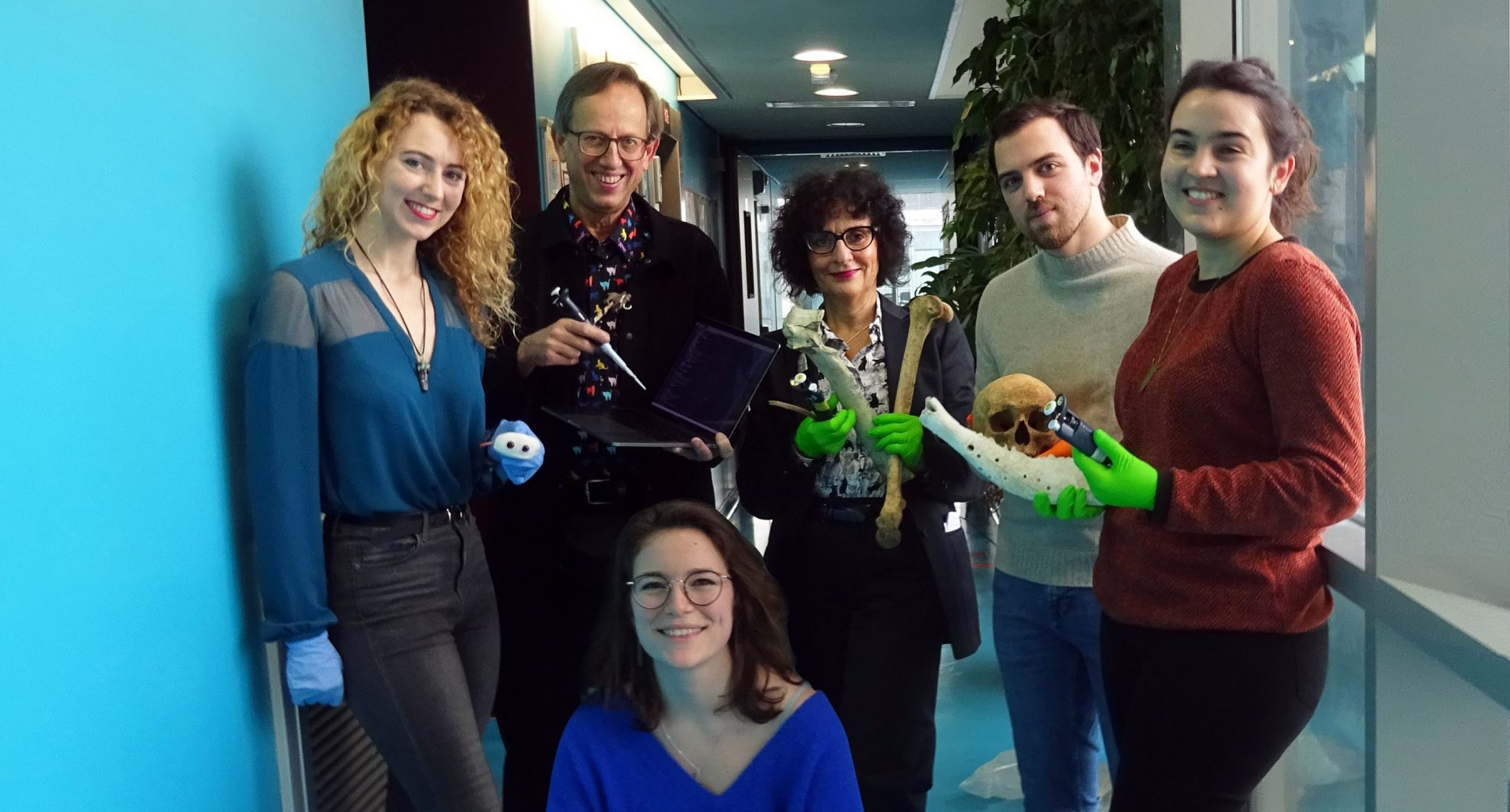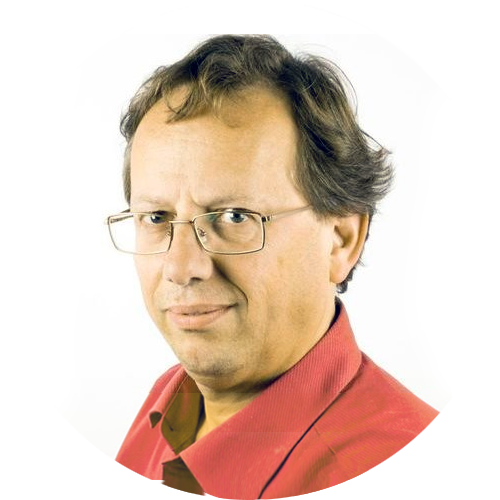The “Epigenomics and Paleogenomics” Gruppen ”Epigenomics and Paleogenomics” från Institut Jacques Monod, Université de Paris och French National Center for Scientific Research (CNRS) är intresserad av utvecklingen av genom, arter och populationer av djur, inklusive människor. Deras tillvägagångssätt är studiet av DNA som bevarats i arkeologiska och paleontologiska ben eftersom dessa är de direkta vittnen till evolution. De utvecklade både dekontaminering och konstruktionsmetoder för bibliotek (av genetiska data) för att öka tillförlitligheten och effektiviteten i analysen av förhistoriska genom (aDNA). Teamet utför alla steg i analysen, från beredning av benprover till analys av genomsekvenser för att maximera kontrollen av de procedurer som kan vara felbenägna. Detta är möjligt tack vare den infrastruktur de driver, inklusive ett laboratorium för hög inneslutning och en sekvenseringsanläggning.
Teamet bedriver för närvarande två stora forskningsteman: 1) å ena sidan analysen av populationsdynamik, fylogeografi och domesticering av djur, särskilt boskap och katter; 2) å andra sidan utvecklingen av människobefolkningar i Europa, med särskilt fokus på det nuvarande Frankrikes territorium, från övre Pleistocen till medeltiden.
Det internationella teamet av grund- och doktorander samt forskare leds av två molekylärbiologer, Eva-Maria Geigl och Thierry Grange. För närvarande finns det fyra doktorander från fyra olika länder och fyra olika kontinenter som arbetar med olika projekt: Oğuzhan Parasayan studerar bosättandet av Frankrike, Wejden Bendhafer utvecklingen av bison och uroxensamt domesticering av den senare, Jeanne Mattei studerar kattens domesticering och Caitlin Martin arbetar med utveckling och selektions av det mänskliga genomet genom hela Holocen-perioden.
Eva-Maria Geigl
Eva-Maria Geigl tog examen med ett statsdiplom i kemi och biologi och doktorsexamen i molekylär genetik från Ludwig-Maximilian-universitetet i München, Tyskland. Under sitt postdoktorala arbete vid Stanford University Medical Center, USA, deltog hon i Human Genome Project med fokus på fysisk kartläggning av kromosomer och analys av endogena retrovirussekvenser. Hon gick sedan över till Jacques Monod Institute i Paris där hon som EU-stipendiat undersökte arkitektur och utveckling av mänskliga kromosomer. Senare blev hon intresserad av att använda den paleogenetiska metoden för att studera utvecklingen av genom och art och utvecklade projekt inom detta område. Hon inrättade anläggningen ”Paleogenomics and Molecular Taphonomy” för Jacques Monod Institute i Paris och driver forskargruppen ”Epigenomics and Paleogenomics” som forskningsdirektör vid French National Research Centre CNRS tillsammans med Thierry Grange.
Geigl deltog i Human Genome Project under sitt postdoktorala arbete vid Stanford University.
Thierry Grange
Thierry Grange har en doktorsexamen i mikrobiologi vid University Paris Diderot. Som molekylärbiolog och genetiker studerade han i början av sin karriär vid French National Research Centre (CNRS) olika aspekter av mikrobiologi och virologi och senare reglering av genuttryck, vävnadsspecificitet och steroidhormonsvar, kromatin och epigenetiskt minne. hos däggdjur. Han har varit gruppledare vid Institut Jacques Monod i nästan 30 år. Han samarbetade sedan med Eva-Maria Geigl och sedan 2009 driver de forskargruppen ”Epigenomics and Paleogenomics” vid Institut Jacques Monod. Han är ansvarig för institutets genomikanläggning.
Grange har varit gruppledare vid Institut Jacques Monod i nästan 30 år.
Relevanta publikationer
The genetic identity of the earliest human-made hybrid animals, the kungas of Syro-Mesopotamia
Bennett E.A., Weber J., Bendhafer W., Champlot S., Peters J., Schwartz G.M., Grange T., Geigl E.-M. (2022). Sci Adv. 14;8(2):eabm0218.
Ancient genomes from present-day France unveil 7,000 years of its demographic history
Brunel, S., Bennett, E.A., Cardin, L., Garraud, D., BarrandEmam, H., Beylier, A., Boulestin, B., Chenal, F., Cieselski, E., Convertini, F., Dedet, B., Desenne, S., Dubouloz, J., Duday, H., Fabre, V., Gailledrat, E., Gandelin, M., Gleize, Y., Goepfert, S., Guilaine, J., Hachem, L., Ilett, M., Lambach, F., Mazière, F., Perrin, B., Plouin, S., Pinard, E., Praud, I., Richard, I., Riquier, V., Roure, R., Sendra, B., Thevenet, C., Thiol, S., Vauquelin, E., Vergnaud, L., Grange, T., Geigl, E.-M., Pruvost, M. (2020). Proceedings of the National Academy of Sciences USA, 117(23):12791-12798.
Ancient DNA shows domestic horses were introduced in the southern Caucasus and Anatolia during the Bronze Age
Guimaraes, S., Arbuckle, B., Peters, J., Adcock, S., Buitenhuis, H., Chavin, H., Manaseryan, N., Uerpmann, H.-P., Grange, T., Geigl, E.-M. (2020). Science Advances, 6: eabb0030.
Using paleogenetics to unravel the impact of humans on animal populations in the past
Geigl, E.-M. & Grange, T. (2019). In Animals: Cultural Identifiers in Ancient Societies? J. Peters, G. McGlynn & V. Goebel (eds)., Verlag Marie Leidorf (VML) GmbH, Rahden/Westf. p.131-137
Morphology of the Denisovan phalanx closer to modern humans than to Neanderthals
E. Andrew Bennett, Isabelle Crevecoeur, Bence Viola, Anatoly P. Derevianko, Michael V. Shunkov, Thierry Grange, Bruno Maureille, and Eva-Maria Geigl (2019). Science Advances, 5:eaaw3950.
The evolution and population diversity of bison in Pleistocene and Holocene Eurasia: Sex matters
Grange, T., Brugal, J.-P., Flori, L., Gautier, M., Uzunidis, A., and Geigl, E.-M. (2018). Diversity 10, 65.
Ancient DNA: The quest for the best
Geigl, E.-M., Grange, T. (2018) Ancient DNA: The quest for the best. Mol Ecol Resour. 18:1185–1187.
The paleogenetics of cat dispersal in the ancient world
Ottoni, C., Van Neer, W., De Cupere, B., Daligault, J., Guimaraes, S., Peters, J., Spassov, N., Prendergast, M.E., Boivin, N., Morales-Muniz, A., Bălăşescu, A., Becker, C., Benecke, N., Boronenanț, A., Buitenhuis, H., Chahoud, J., Crowther, A., Llorente, L., Manaseryan, N., Monchot, H., Onar, V., Osypińska, M., Putelat, O., Studer, J., Wierer, U., Decorte, R., Grange, T., Geigl, E.-M. (2017). Nature Ecology & Evolution 1, 0139.
Taming the late Quaternary phylogeography of the Eurasiatic wild ass through ancient and modern DNA
Bennett, E.A., Champlot, S., Peters, J., Arbuckle, B.S., Guimaraes, S., Pruvost, M., Bar-David, S., Davis, S.J.M., Gautier, M., Kaczensky, P., Kuehn, R., Mashkour, M., Morales-Muñiz, M., Pucher, E., Tournepiche, J.-F., Uerpmann, H.-P., Bălăşescu, A., Germonpré, M., Y. Günden, C., Hemami, M.-R., Moullé, P.-E., Öztan, A., Uerpmann, M., Walzer, C., Grange, T.*, Geigl, E.-M.* (2017). PLoS One 12(4): e0174216.
A cost-effective high-throughput metabarcoding approach powerful enough to genotype ~44 000 year-old rodent remains from Northern Africa
Guimaraes S, Pruvost M, Daligault J, Stoetzel E, Bennett EA, Côté NM, Nicolas V, Lalis A, Denys C, Geigl E.-M., Grange T. (2017). Mol EcolResour. 17: 405-417.
Past climate changes, population dynamics and the origin of Bison in Europe
Massilani, D., Guimaraes, S., Brugal, J.-P., Bennett, E.A., Tokarska, M., Arbogast, R., Baryshnikov, G., Boeskorov, G., Castel, J.-C., Davydov, S., Madelaine, S., Putelat, O., Spasskaya, N., Uerpmann, H.-P., Grange, T., Geigl, E.-M. (2016). BMC Biology 14:93-110.
Analysis of ancient DNA in microbial ecology
Gorgé O, Bennett EA, Massilani D, Daligault J, Pruvost M, Geigl EM, Grange T. (2016). Methods Mol Biol. 1399:289-315.
A new high-throughput approach to genotype ancient human gastrointestinal parasites
Côté, N.M.L., Daligault, J., Pruvost, M., Bennett, E.A., Gorgé, O., Guimaraes, S., Capelli, N., Le Bailly, M., Geigl, E.-M., Grange, T. (2016). PLoS One 11(1):e0146230.
Library construction for ancient genomics: single strand or double strand?
Bennett, E.A., Massilani, D., Lizzo, G., Daligault, J., Geigl, E.-M., Grange, T. (2014). Biotechniques 56:289-300.
An efficient multistrategy DNA decontamination procedure of PCR reagents for hypersensitive PCR applications
Champlot, S., Berthelot,C., Pruvost, M., Bennett, E.A., Grange, T., Geigl, E.-M. (2010). PLoS One 5(9):e13042.
Early bone diagenesis in temperate environments: Part I: Surface features and histology
Fernandez-Jalvo, Y., Andrews, P., Pesquero,D., Smith, C., Marin-Monfort, D., Sanchez, B., Geigl, E.-M., Alonso, A. (2010). Palaeogeography, Palaeoclimatology, Palaeoecology 288:62-81.
Palaeogenetics of cattle domestication: Methodological challenges for the study of fossil bones preserved in the domestication centre in Southwest Asia
Geigl, E.-M. (2008). Comptes Rendus Palévol 7(2-3): 99-112.
DNA diagenesis and palaeogenetic analysis: Critical assessment and methodological progress
Pruvost, M., Schwarz, R., Bessa Correia, V., Champlot, S., Grange, T. and Geigl, E.-M. (2008). Palaeogeography, Palaeoclimatology, Palaeoecology, 266 (3-4): 211-219.
Freshly excavated fossil bones are best for ancient DNA amplification
Pruvost, M., Schwarz, R., Bessa Correia, V., Champlot, S., Braguier, S., Morel, N., Fernandez-Jalvo, Y., Grange, T. and Geigl, E.-M. (2007). Proceedings of the National Academy of Sciences. 104 (3): 739-744.
On the circumstances surrounding the preservation and analysis of very old DNA
Geigl, E.-M. (2002). Archaeometry 44 (3) :337-342, 2002
Inadequate use of molecular hybridization to analyze DNA in Neanderthal fossils
Geigl, E.-M. (2001). The American Journal of Human Genetics 68:287-290; S0002-9297(07)62499-9.


